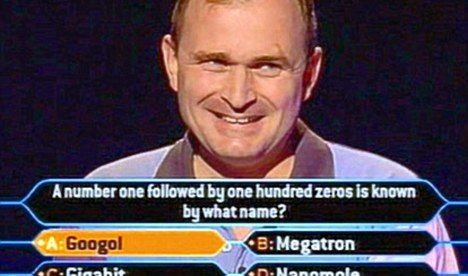The Million Pound Cough

In the mid-to-late 1990s, Sergey Brin and Larry Page were Ph.D. candidates at Stanford University, building what they hoped would become the world’s go-to Internet search engine. They had some neat technology, some powerful (for the time) servers, and all the bandwidth they’d need to launch. All they really needed was a name. One of them knew that a “googol” was a really huge number — a one with one hundred zeroes after it — and used that with a bit of a misspelling: “Google.”
If you didn’t know that, you aren’t alone. Neither did Charles Ingram. And he was the first to admit it — he had no idea what a googol was.
And that’s how he became a millionaire. Well, kind of.
Let’s rewind a bit: On September 9 and 10, 2001, Ingram was a contestant the British TV show “Who Wants to Be a Millionaire?” (yes, it was British first) — and a successful one at that, winning the £1 million grand prize. of his final question — watch the first five minutes when you have a chance. (If you can’t right now, no worries; a summary is below.)
In the clip above, Ingram was met with his final question: “A number one followed by one hundred zeros is known by what name?” He was also presented with four answer choices: “Googol,” “Megatron,” “Gigabit,” and “Nanomole.” The host explains Ingram’s options: Ingram can decide to not answer the question, keeping for himself a £500,000 payday he’s already earned; or he can risk that sum and venture a guess, earning £1 million if he is right but only £32,000 if he’s wrong.
Most people, if they knew the story of the founding of Google — or if they knew the right answer was “googol” for any number of other reasons — would answer the question and celebrate. But if not, you’d expect most people to give up, and take the £500k.
That’s not quite what Ingram did, though. After a bit of hemming and hawing (and saying he’s “not sure”), Ingram says “I think it’s a nanomole… but it could be a gigabit.” He shows a bit more doubt and then says “I don’t think it’s a megatron,” pauses, and then says “I don’t think I’ve heard of a googol.” Then he repeats the word “googol” a few times.
At this point, if you’re watching, you probably think he’s going to take the safe route. And if he does venture a guess, he’s going to choose between nanomole or gigabit, both of which are wrong answers. But then — at about the 1:47 mark in the video — he makes a sudden change of direction: “By process of elimination, I actually think it’s ‘googol,’ but I don’t know what ‘googol’ is.” It’s a total about-face, contradicting what he said a few moments beforehand, and an odd omission to boot.
So what changed? Go back to 1:05 and watch the next forty seconds again. This time, pay attention to the crowd noise. When Ingram says “nanomole,” they’re rather quiet. The same is true for “megatron” and “gigabit.” But when he says “googol,” someone starts coughing loudly. A coincidence? Maybe — but if so, it happens a few more times as he deliberates. Oh, and the coughing fits popped up on the other questions as well. Check out the video of Ingram trying to go from £32,000 to £64,000, for example, and the same thing happens: Ingram says some of the answers aloud, and after he says the right answer, someone coughs loudly. The £500k question? Same thing. And so on, and so forth.
The ruse, as VICE reported, involved his wife Diana (herself a former Millionaire contestant) and a college lecturer named Tecwen Whittock who, like Mrs. Ingram, had a history of television trivia game show success. The plan, per VICE, was enticingly simple: Ingram would recite all the answers (if necessary) and Whittock would cough upon hearing the correct one. But the plan wasn’t designed to last 15 questions — Mr. Ingram was, apparently, supposed to stop after winning £64,000, suggests VICE. After the recording, the should-be-happy couple was anything but, arguing about something (probably Mr. Ingram’s decision to push well past the agreed-upon threshold). A producer noticed and investigated further, and ultimately, discovered the oddly coincidental coughing fits.
The Ingram were stripped of their prize and, with Whittock, prosecuted criminally for deception. They were convicted, fined, and given suspended sentences. The defendants have appealed many times over, getting reductions in penalties but never achieving the sought-after exoneration. To this day, they maintain their innocence.
Bonus fact: “Megatron” isn’t a unit of measure at all — it’s the name of the bad guy from the TV show Transformers. The original toy version of Megatron (from 1984) transformed into a very realistic-looking gun — see a picture here — and as a result, you can’t bring it on a plane in your carry-on luggage. (Per the TSA, “replica firearms and toys” can only be transported in checked baggage.) The TSA is more forgiving when it comes to the Star Wars universe, though; toy lightsabers are perfectly OK as carry-ons. Real ones? The TSA advises that “sadly, the technology doesn’t currently exist to create a real lightsaber,” so they don’t worry about it too much.
From the Archives: The Price is Exactly Right: The guy who beat The Price is Right, without cheating.
Related: “Bad Show: The Quiz, the Cough, the Millionaire Major,” a book which argues that Ingram and company are innocent. On Amazon’s UK site, it’s very well received, with 22 reviews averaging 4.7 reviews.
